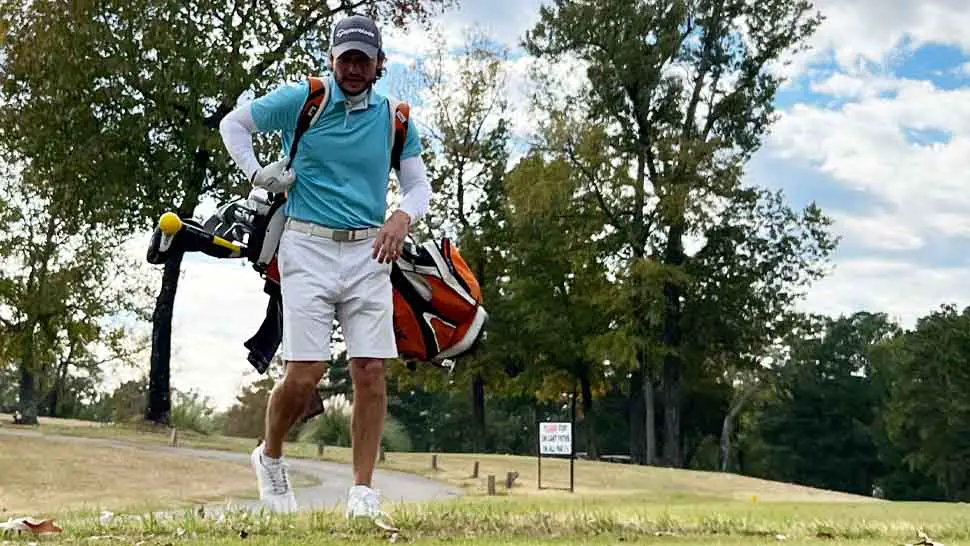For first-timers, golf can be a bit intimidating.
Just making sure you have all the necessary equipment can be stressful.
To add another layer, you really have no idea how long you should expect your first golf round to be!
Fear not my friend, we tell you exactly what to expect (and how long it should take).
Key Takeaways
What is a Typical Round Time for a First-Timer?
A typical round of golf consists of 18 holes, and the average time it takes to complete a round can vary significantly based on a golfer’s skill level and the speed of play.
More experienced golfers can typically play 18 holes in 3.5 to 4 hours. How long should you expect your first golf round to take is approximately 5.5 to 6 hours for your initial round.

This additional time accounts for several factors unique to first-time golfers:
- Familiarizing with the course: First-timers may need extra time to navigate the course, locate each hole, and assess the layout and hazards.
- Perfecting shots: New golfers often require more shots to complete a hole due to their growing skill set and comfort level with the game.
- Etiquette and pacing: Golf courses have established etiquette and pacing guidelines, which first-time golfers may need some time to learn and follow.
As you continue to play golf and gain more experience, you will definitely see your round time decrease.
Tip: The best thing a new golfer can do is play with experienced players and watch how they navigate the course.
The more rounds you play, the more confidence you will gain more confidence as you move around the course.
Factors that Can Increase Time for Beginners
Unfamiliarity with Basic Rules and Etiquette
For beginners, one of the factors that can increase the time it takes to play a round of golf is being unfamiliar with the basic rules and etiquette.
Golf courses have their guidelines for maintaining pace of play, and it often involves adhering to proper etiquette like keeping up with the group ahead or being conscious of the time spent on each shot.
It’s essential for new golfers to understand these basics to blend seamlessly into the course without causing congestion.
Overthinking Club Selection on Each Shot
Another factor that comes into play is overthinking the club selection for each shot.

Although it’s important to choose the right club for the appropriate distance and situation, spending too much time in the decision-making process can lead to slow play.
Tip: If you have access to any type of shot tracker and/or launch monitor, getting some time on using these and finding your yardages will be great for overall progress in knowing iron distances.
As beginners gain experience and learn more about their clubs’ capabilities, they’ll become more efficient in selecting the appropriate clubs for each shot.
Taking Multiple Practice Swings
Taking multiple practice swings before hitting the ball can not only slow down the pace of play but also be detrimental to the quality of the shot.
If you do this too much, it’s going to greatly piss off your other playing partners.
As beginners, it’s crucial to find a consistent tempo and limit the number of practice swings to no more than a couple before taking the actual shot.
Searching for Lost Balls
Searching for lost balls in hazards, rough areas, or woods can significantly contribute to the increased time for beginners.
All golfers will occasionally lose a ball, but spending excessive time combing the course for the missing golf ball can significantly slow down play.
Tip: Try not to spend more than a minute looking for a potentially lost ball.
It’s important to be aware of course congestion and limit the time spent searching for lost balls.

Tips to Play Faster During Your First Round
Limit Practice Swings to 1-2 Times
We know it can be tempting to take multiple practice swings, but limiting yourself to just one or two will help speed up your round.
Remember, the goal is to find a comfortable rhythm before taking your shot. Excessive practice swings not only slow you down but can also tire you out, affecting the quality of your shots later in the game.
Don’t Obsess Over Club Choice
When you’re just starting, you likely won’t have the experience to know exactly which club to use in every situation.
A good rule of thumb is to use the longer club of the two in question.
Most amateurs tend to club down and swing harder at the ball when they feel indecisive on club choice.
This is bad practice because it forces you to swing unnaturally and, more often than not, get bad results.
Play Ready Golf – Be Ready When It’s Your Turn
Ready golf” is a term used for maintaining an appropriate pace of play.
This means always being ready to take your shot when it’s your turn. Practice being efficient in your pre-shot routine, taking your practice swing and addressing the ball as you wait for others in your group to play.
Don’t Be Afraid to Pick Up Your Ball if Holding Others Up
Don’t be too proud to pick up your ball if you’re struggling on a hole and holding up your playing partners or the group behind you.
When you are just starting to play golf, you shouldn’t worry about your score.
In the beginning, it’s all about fundamentals.
If your group has an understanding of the “double max” rule, make sure you abide by that and pick your ball up if you have a putt for triple bogey.
How Long Before You Develop a Consistent Pace?
For first-time golfers, playing through 18 holes can feel intimidating and may take longer than anticipated.
However, as I stated earlier, if you can play with more experienced golfers, you can quickly learn to play at a consistently quick pace in 8-10 rounds.
In the beginning, our primary focus should be on understanding the game the rules, and getting comfortable with our swings.
As new golfers, we should not worry too much about maintaining a quick pace of play.
New players commonly take about 5 to 5.5 hours to complete 18 holes, especially if playing in a foursome. Tee times at most golf courses are spaced around 8 to 15 minutes apart, which allows groups to maintain a reasonable pace on the course.
To develop a consistent pace, it is crucial to practice regularly at golf courses and driving ranges. Spending time with experienced golfers or even taking lessons can help us improve our skills more quickly.
Does walking help better pace of play?

Walking an entire golf course can be a considerable workout, and it is essential to consider this aspect when calculating our expected pace.
If your entire group is walking, then it’s okay for you to walk to maintain a nice pace of play.
However, it’s hard to find an entire group of walkers on the weekend.
Before and after rounds, we should dedicate time to stretching and warming up, as well as allowing ourselves rest periods during play to prevent fatigue from affecting our games.
Lastly, don’t forget to have fun and enjoy the experience.
With time, practice, and the right mindset, we’ll develop a consistent pace and enhance our overall enjoyment of the game.
Making sure to follow golf course etiquette and being considerate of our playing partners will ensure an enjoyable round for everyone.
Frequently Asked Questions
For beginners, an 18-hole round of golf typically takes around 4 to 5 hours to complete. This is because new players may need more time to plan their shots, locate their golf balls, and get accustomed to the game’s rules and etiquette. However, pacing and experience levels among beginner golfers will vary, so the duration can be flexible.
First-timers can generally expect to spend 2 to 2.5 hours time to play a 9-hole round of golf. Since they are new to the sport, it may take additional time for them to adjust to the course and learn basic techniques. Patience is key for first-timers, as they focus on understanding the game and enjoying the experience.
Larger group sizes can often lead to longer golf rounds. When there are more players sharing the course and waiting to take their shots, the pace of play slows down. A group of 2 or 3 players might complete an 18-hole round in about 3.5 to 4 hours, while a group of 4 players might take around 4.5 hours to finish.
Several factors can influence the pace of play on a golf course, including player skill level, course difficulty, and weather conditions. Novice golfers might require extra time to strategize and execute shots, while more experienced golfers can navigate the course more efficiently. Additionally, a challenging course layout, hilly terrain, and inclement weather may prolong the round.
New golfers can improve their pace of play by practicing good course management and being mindful of time. This includes preparing for each shot while waiting for their turn, maintaining a brisk walking pace between holes, and keeping up with the group ahead. Spending time at the driving range and taking lessons can help beginners develop their skills and increase their confidence on the course.
Yes, there are tools available to help estimate the duration of a golf round. Some golf course websites and mobile apps may include time calculators that factor in variables such as handicaps, group sizes, and more. Please remember that these tools provide estimates, and actual times may vary depending on various factors discussed earlier in this FAQ section.

